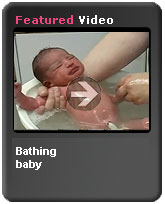Baby cries to Communicate
Crying is the only means of communication baby has
with you. Answer her cries as soon as you can. Responding
to her cries with immediacy during the first 6 months
won't spoil her. On the contrary, you are teaching
her to trust you, which in turn creates a positive,
confident and happy baby. Each and every baby cries
in various ways to express what they feel and sense.
Every infant has a few distinct cries that form their
first language.
Cry of pain:
This cry begins as a shrill scream, accompanied by
a silent phase and a series of short gasps; then the
cycle repeats. It is an urgent cry for help. Maybe
your baby has bumped her head or she has been accidentally
brushed against something hot. But the message is
your baby has sustained some physical hurt and she
needs you to make it all right. It may take you a
while to pacify baby who has been hurt. Of course
if the injury is serious or she simply won't stop
her wails, call her pediatrician.
Cry of hunger:
Cries that start slowly and build into a loud demanding
wail is usually a signal of hunger. Babies take a
while to settle into a feeding routine and will therefore
get hungry at various times during the day. Just after
being nursed she may want some more. Sometimes all
she wants is your company. Baby 'hungers' for attention
and stimulation, apart from food. If baby refuses
food, then she may be saying 'I want you to be with
me'. Whether you are breast-feeding or bottle-feeding,
cuddle your baby close; your baby thrives on this.
 Cry of discontentment:
Cry of discontentment:
When tired or moody, your baby may cry in a mild or
fussy way. The longer you ignore the fussing, the
louder the cries become. It sounds even more forceful
than the hunger cry. Babies also cry when expressing
discomfort, anger and other physical or emotional
distress.
The quality of cry will help you determine what is
ailing your baby but you should also check for other
signs such as what is happening to her and around
her. For example if she repeatedly draws her legs
up and straightens them, she is conveying that her
tummy hurts. Burping may help. She may also cry in
response to some sound in her environment. For example,
another baby's squalling can cause her to follow suit.
Babies this age are too young to understand intention
and consequence but will understand that you can be
relied on. You are not going to create a brat if your
baby receives immediate attention each time he cries.
On the same token you should not feel pressured to
answer every cry pronto. Sometimes it is just not
possible because of an insistent doorbell or food
you left on the hot stove or you are plain fatigued
to offer comfort to your baby. There is no harm done
if you keep such delays to a minimum.
Some measures to help calm
your crying infant.
• Make sure she is not hungry, wet, cold, hot
or hurt.
• Hold her close in your arms and look into
her eyes. Gently rock her.
• Talk to her in a quiet voice; assure her she
is safe with you.
• Gently touch her. Hold her till her crying
ebbs.
Try these if none of those
worked.
• Take shower with baby. The sound of running
water has a soothing effect.
• Put her in swing, crank it up and let it go.
• Go for a walk with baby in an infant sling
or stroller.
• Massage your baby.
If baby is inconsolable despite your efforts, schedule
a visit to the doctor to rule out possible ear infection
or strep throat.